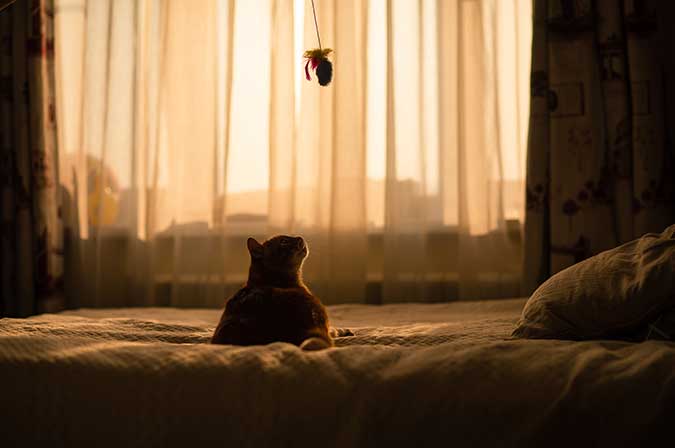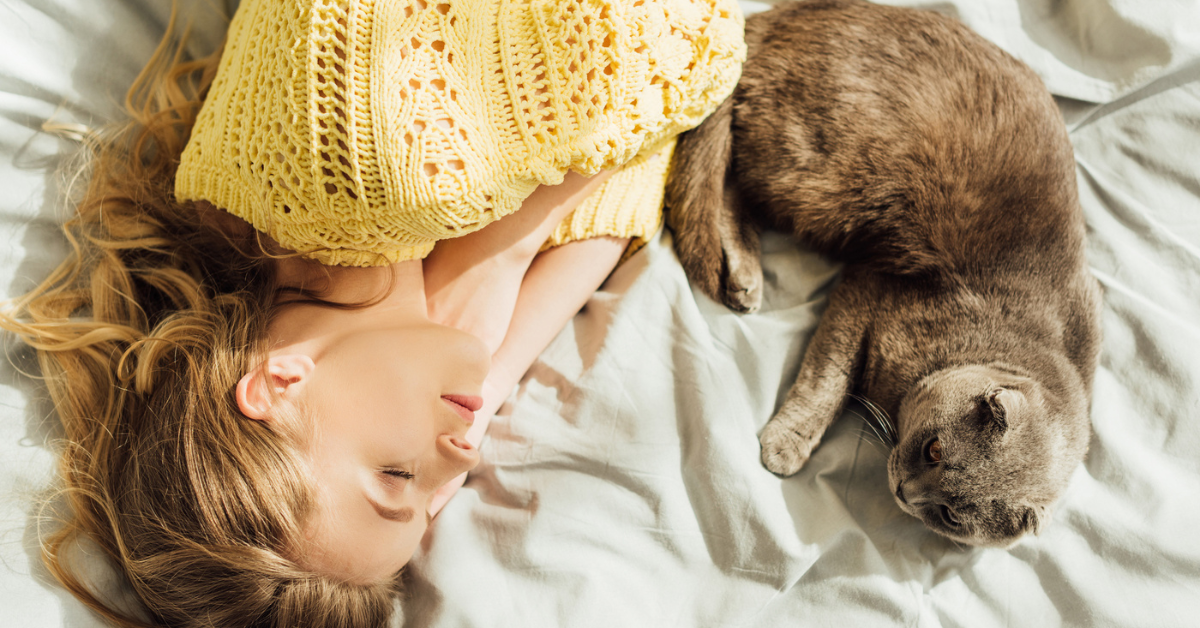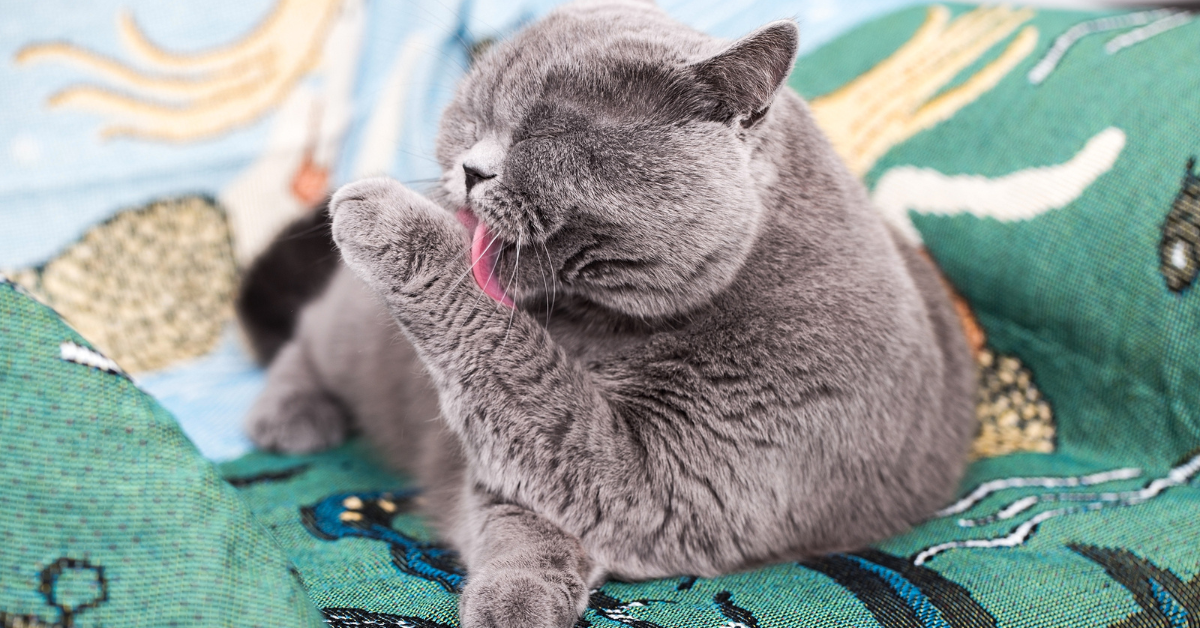Why Do Cats Sleep So Much?

If you have a cat and are reading this now, there's a good chance that they are somewhere snoozing away. Have you ever wondered why cats sleep so much or wondered if it's possible for a cat to sleep too much? In this article, we're going to answer the question of why and how often cats sleep along with how to tell if your feline friend is spending too much time in slumber land, so read on!
HOW MUCH TIME DO CATS SPEND SLEEPING?
This answer depends on a few factors, one of them being your cats stage of life. Kittens, for instance sleep most of the day and night. On average, healthy adult cats will sleep somewhere around 12-20 hours per day. Senior cats may also sleep more due to less energy and reduced mobility. Sound like a lot? When compared to the 7-9 hours of sleep that the average adult needs per night, it sure seems like an excessive amount of slumber! However, there are reasons why cats need the amount of sleep that they do.
WHY DOES MY CAT NEED SO MUCH SLEEP?
There are a few reasons why you may catch your cat snoozing more often than not! The first has to do with primal instincts and energy conservation. Cats are hunters by nature, and hunting requires a lot of energy. Your small house cat may not necessarily be hunting live animals for food, but these instincts can be traced back to their ancestors, despite generations of breeding and domestication. Whether your cat helps keep the rodents away or enjoys chasing their toys, they want to store up enough energy for their next hunt or play session!
Something else to note is that cats are crepuscular, which means that they are the most active during dawn and dusk. While some cats may be considered nocturnal (awake and active during the night), many of them actually have the most energy during the in-between twilight hours. Have you noticed this to be true of your cat? You may want to start keeping track of the times when they are most active so that you can know the best times to play and interact with your cat.

Some cats may also match their schedules to that of their owners, especially bedtime and mealtimes. For example, if you are feeding your cat at a specific time each day, your cat is smart enough to pick up on this and will begin to look forward to it. They may run excitedly to the kitchen at the same time every day, even before you get there to feed them! Cats love routine, so having something for them to look forward to or rely on each day can be good for their well-being and sense of security.
Getting your cat on a schedule can also be beneficial when it comes to your sleep. If your cat is active at night and often keeps you awake by meowing or pouncing on the bed, you may want to try training them to follow your sleep schedule. One way to do this is by playing with them in the evenings around twilight (when they are already the most active) so that they can exhaust a bit of their energy and hopefully be able to wind down a bit when you're ready to get some sleep!
Another aspect that may affect your cat's sleep is the weather. This is something we can relate to as humans. Do you find yourself feeling a bit more sleepy and sluggish on rainy days? Cats are the same! You may notice them napping more throughout the day and refusing to leave their comfy beds when the weather is dreary. When the sun is shining, your cat may be more likely to have some extra energy for playtime, and may have more entertaining things to watch from the window, such as birds flying in the sky, people out walking their dogs, etc.
WHEN SHOULD I BE WORRIED?
You typically don't need to be concerned about your cat's sleeping patterns. Because cats can sleep up to 20 hours per day and still be perfectly healthy, you likely don't need to be worried if at times you see your cat awake and active seem few and far between, especially if he or she is elderly. However, if you notice your cat neglecting their food or if they seem to have lower energy levels than usual in addition to sleeping more, you may want to schedule a visit to the vet. They could be dealing with an illness, so it's best to be cautious and have them examined to be sure they aren't in any pain or discomfort.
CONCLUSION
Hopefully this article has given you some good insight as to why your feline friend sleeps so much as well as some good ideas of how to make the best of their time spent awake and active! Typically their sleep is not something to be worried about, but be sure you keep an eye on their sleep patterns in case you notice anything changing.
Sources:
- https://www.ovrs.com/blog/cats-sleep/
- https://www.hillspet.com/cat-care/behavior-appearance/why-cats-sleep-so-much
- https://www.petmd.com/cat/behavior/evr_ct_why_do_cats_sleep_so_much
- https://blog.petcube.com/how-much-do-cats-sleep/
- https://www.aecmemphis.com/site/vet-blog-memphis/2020/02/13/my-cat-sleeps-constantly-when-should-i-worry
Previous article

Next article

Related posts
View all-

5 Simple Tips to Make Sure Your Cat Drinks Enough Water
Ensuring your cat stays hydrated is important, but it can be challenging since many cats don't drink enough water. Dehydration can lead to kidney disease and other health issues. Fortunately, you can encourage your cat to drink more with a few simple changes. Read Article -

How to Keep Your Cat Busy at Night (So You Can Sleep)
For many cat owners, the quest for a good night's sleep while keeping their feline friends content and engaged can seem like a never-ending battle. Cats, naturally more active at night or early in the morning, often disrupt your sleep schedules with nocturnal activity, whether through playful nature or seeking attention. Read Article -

Should You Bathe Your Cat? Everything You Need to Know About Cat Hygiene
When it comes to cat hygiene, a common question among cat owners is, "Should you bathe your cat?" Understanding how to care for felines, especially bathing cats properly, is crucial for maintaining their overall health. Most cats are fastidious groomers, but specific scenarios like long-haired cats getting dirty or skin irritations, might require a bath.
Read Article



